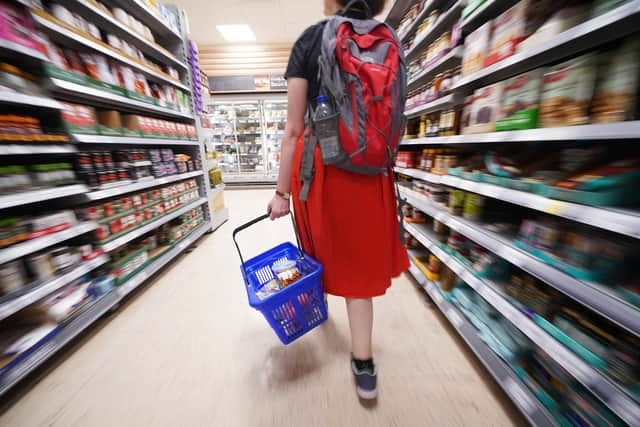Inflation analysis: Government faces momentous challenge halving double-digit rate by end of year
We have now had three months and three declines in the annual rate of consumer price inflation, from October’s heady 41-year peak of 11.1 per cent to 10.1 per cent in January, according to the latest data from the Office for National Statistics (ONS). Last month’s cooling was driven by the price of air and coach travel dropping back while petrol and diesel prices continued to fall. There was also a dip in restaurant, cafe and takeaway prices.
Inflation might be heading in the right direction but the downward travel appears glacial with it stuck in double-digit territory. For the vast majority of everyday purchases prices are not falling, they are simply rising less sharply. The major supermarkets have been attempting to keep a lid on those price hikes but several eye-watering increases are now being passed on to shoppers. In recent days, one major chain has pushed up the cost of a box of Mr Kipling cakes from £1.75 to £2.50 and Loyd Grossman pasta sauces from £2.20 to £3, for example. Hikes of that nature will no doubt feed into the February inflation figures, which will be published next month, while higher utility costs are in the pipeline when the energy price cap rises in April.
Advertisement
Hide AdAdvertisement
Hide AdThe UK government is convinced that it can halve inflation by the end of the year but that goal is beginning to look somewhat optimistic. A similar picture is emerging across the Atlantic, where, despite a series of declines, market-watchers remain disappointed at just how sticky US inflation has become.
Ed Monk, associate director, personal investing, at Fidelity International, said: “Inflation may be on a downwards course but progress is painfully slow. The fall in UK CPI [consumer prices index] inflation to 10.1 per cent at least continues the downward trend of recent months but households will continue to feel squeezed as long as their living costs continue to run ahead of the pay rises. And there’s the rub for the UK economy right now - inflation is eroding worker wages and making them poorer in real terms, yet wages are rising strongly in cash terms which means the Bank of England will feel it has little room to lower interest rates to help growth. This will still take many months to unwind.”
Ben Laidler, global markets strategist at social investing network eToro, pointed to a “frustratingly slow-paced decline” in inflation with the UK nursing one of the highest rates among major economies globally. He added: “It’s a step in the right direction with the Bank of England forecasting a fast inflation fall from mid-year, to around 4 per cent by the end of 2023, as lower natural gas prices are felt in the broader economy and the jobs market eases. If this forecast works out, then mortgage holders can look forward to some relief when the base rate starts to drop, potentially around this time next year. It’s still a long and potentially bumpy road ahead though.”
Kevin Brown, savings specialist at Glasgow-based mutual Scottish Friendly, questioned whether inflation was falling fast enough, pointing out that it remains more than five times above the 2 per cent target for the Bank of England’s monetary policy committee, which may force it to raise interest rates further over the coming months. “The concern is that this risks putting more pressure on the country’s hard-pressed households, who are the lifeblood of the UK economy,” Brown warned. “Higher borrowing costs would add to the woes of workers who are already suffering real-term pay cuts with prices rising at a faster rate than their income.
“A small drop in the headline rate of inflation won’t be felt by most families who are still struggling to make ends meet. If inflation remains sticky and doesn’t fall fast enough, then rates rises will be required to help bring it down.”


Nicholas Hyett, investment analyst at Wealth Club, noted: “Is inflation still problematically high or is it now coming under control? You could argue for either, or even both, a sign of the confused picture for inflation at present. It won’t make life easier for the policymakers, and raises questions around the future course of interest rates in particular.”
Thomas Pugh, economist at audit, tax and consulting firm RSM UK, believes that inflation is coming under control and will fall sharply by the end of the year, saying: “Whatever happens with interest rates next month, inflation should decline rapidly from here, reaching 2 per cent again by early 2024, and possibly a little sooner if the big fall in energy prices is maintained.”
Business leaders welcomed news of the fall in headline inflation, as well as the rate of services inflation, which is closely linked to domestic demand conditions, from 6.8 per cent to 6 per cent in January, but said prices have settled at a much higher level than two years ago. David Bharier, head of research at the British Chambers of Commerce, said: “Most small firms remain hammered by rising costs from energy, raw materials, interest rates, taxation and new trade barriers with Europe. The energy crisis, as the main driver of inflation, requires a clear policy solution.
Advertisement
Hide AdAdvertisement
Hide Ad“Small businesses need support to become greener and more energy efficient, and longer-term change in the energy market is required to avoid the large-scale market failure we are currently experiencing. Businesses are desperate for concrete action in the upcoming Budget across a range of areas.”
Comments
Want to join the conversation? Please or to comment on this article.